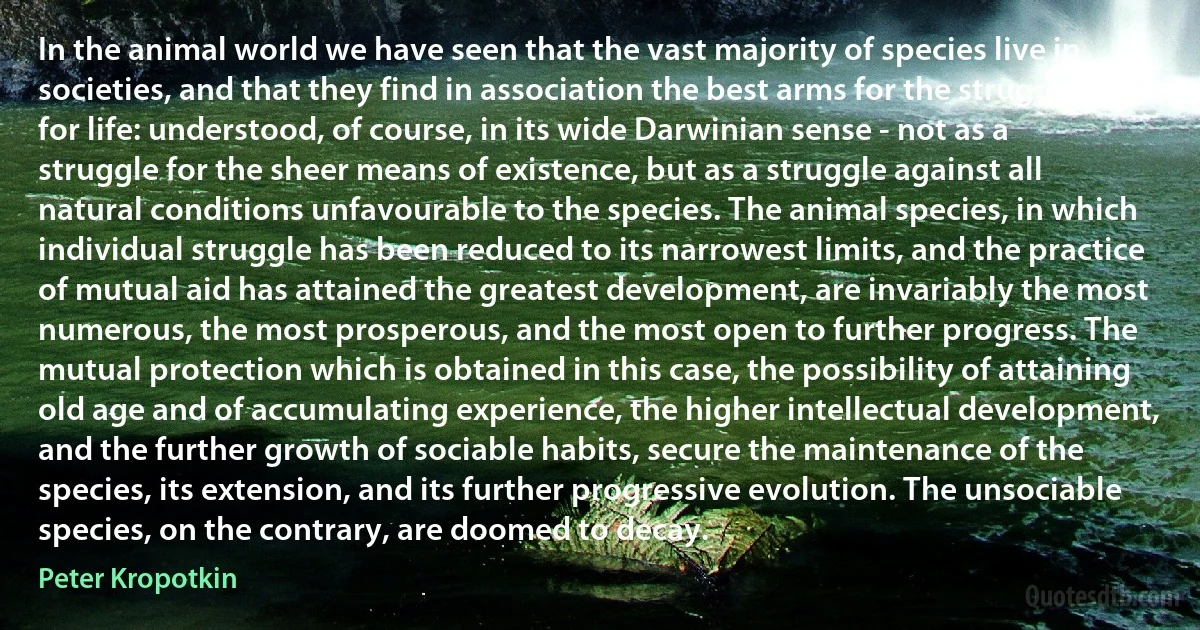
In the animal world we have seen that the vast majority of species live in societies, and that they find in association the best arms for the struggle for life: understood, of course, in its wide Darwinian sense - not as a struggle for the sheer means of existence, but as a struggle against all natural conditions unfavourable to the species. The animal species, in which individual struggle has been reduced to its narrowest limits, and the practice of mutual aid has attained the greatest development, are invariably the most numerous, the most prosperous, and the most open to further progress. The mutual protection which is obtained in this case, the possibility of attaining old age and of accumulating experience, the higher intellectual development, and the further growth of sociable habits, secure the maintenance of the species, its extension, and its further progressive evolution. The unsociable species, on the contrary, are doomed to decay.
Peter KropotkinRelated topics
age animal arms best case course darwinian development evolution experience extension find intellectual life live maintenance natural open possibility practice progressive seen sense unsociable vast wide world means higherRelated quotes
It has been argued that the perfection of guns of great destructive power will stop warfare. So I myself thought for a long time, but now I believe this to be a profound mistake. Such developments will greatly modify, but not arrest it. On the contrary, I think that every new arm that is invented, every new departure that is made in this direction, merely invites new talent and skill, engages new effort, offers new incentive, and so only gives a fresh impetus to further development. Think of the discovery of gun-powder. Can we conceive of any more radical departure than was effected by this innovation? Let us imagine ourselves living in that period: would we not have thought then that warfare was at an end, when the armor of the knight became an object of ridicule, when bodily strength and skill, meaning so much before, became of comparatively little value? Yet gunpowder did not stop warfare: quite the opposite it acted as a most powerful incentive.

Nikola Tesla
There are two ways of considering society. According to some, the development of human associations is not subject to providential, unchangeable laws. Rather, these associations, having originally been organized in a purely artificial manner by primeval legislators, can later be modified or remade by other legislators, in step with the progress of social science. In this system the government plays a preeminent role, because it is upon it, the custodian of the principle of authority, that the daily task of modifying and remaking society devolves.According to others, on the contrary, society is a purely natural fact. Like the earth on which it stands, society moves in accordance with general, preexisting laws. In this system, there is no such thing, strictly speaking, as social science; there is only economic science, which studies the natural organism of society and shows how this organism functions.

Gustave de Molinari
Take a moment to remember the times on your own spiritual quest when you felt most enthusiastic. We want to pinpoint the times in which we felt more God conscious and devotional than ever before. Conversely, look at the times when you felt unenthused and do a similar analysis. These questions might help stimulate your thought process: Are you enthusiastic about your existence as a servant of the Lord? Are you enthusiastic to follow the basic principles that will help elevate your consciousness? Are you enthusiastic in the association of saintly people? Are you enthusiastic about what you can experience in your purest state? We must examine our spiritual life on a daily, weekly, and even yearly basis. This examination will help us recognize how various activities and thoughts affect us. We should note how the quality of our experiences varies according to our absorption in the process of bhakti.

Bhakti Tirtha Swami
We must be prepared to accept the will of God. The Lord permits all sorts of things to happen to us contrary to our will, for if we always have it our way, we will not be prepared for the Kingdom of Heaven. Neither heaven nor earth will receive those who are self-willed.
God has a Divine plan for each one of us, and we must submit to His plan. We must accept life as it is given to us, without asking, "Why me?” We must know that nothing on earth or in heaven ever happens without the will of God or His permission. We must not become too engrossed with our hardships but concentrate on preserving our inner peace.
Even when we are praying for something, we are trying to force our will instead of accepting God's. All hardships and sorrows that God sends us are necessary for us, but we do not understand this when we are young. When we are older, then we understand that this is the way God shows His love for us.

Tadej of Vitovnica
Cultural systems will be treated as extensions of the power to learn, store, and transmit information, and the evolution of culture as dependent upon the biological development of these abilities and the cultural developments that actualize them. Man's increasing mastery over the natural world, with its increments of available energy use, can be seen from this point of view as one consequence of his capacity to learn, invent, borrow, store, and transmit the necessary technological and political inventions for the changes of scale involved in increasing utilization of energy. Instead of focusing attention on discontinuities - the invention of tool-making tools, the invention of agriculture, the invention of writing, and the invention of invention as a conscious pursuit-this discussion will focus on the continuities involved and on the extent to which older forms of communication, energy use, and social organization also undergo transformation in the course of cultural evolution.

Margaret Mead
